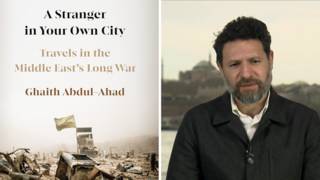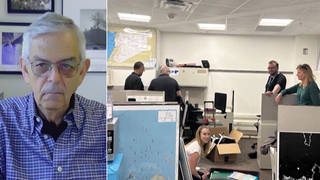
Guests
- Rep. Keith EllisonDemocratic U.S. representative from Minnesota. He is co-chairman of the House Progressive Caucus and is the first Muslim member of Congress.
We get reaction to President Obama’s State of the Union address from Rep. Keith Ellison, co-chair of the Congressional Progressive Caucus and the first Muslim elected to Congress. He discusses Obama’s policies on war, the Trans-Pacific Partnership, the proposed Robin Hood tax, and growing economic inequality.
Transcript
AMY GOODMAN: We’re going to turn right now to Congressmember Keith Ellison, speaking to us from the Russell Rotunda. Congressmember Ellison is co-chair of the House Progressive Caucus, first Muslim member of Congress. On this issue of calling for authorization to attack the Islamic State, your response to that, as well as this comment? And we want to play what Juan was just quoting, this comment of President Obama.
PRESIDENT BARACK OBAMA: As Americans, we respect human dignity even when we’re threatened, which is why I have prohibited torture and worked to make sure our use of new technology like drones is properly constrained.
AMY GOODMAN: Congressmember Keith Ellison, welcome to Democracy Now! Your response?
REP. KEITH ELLISON: Well, thanks for having me on. Let me say that when the president proclaims we don’t torture, that’s a good thing. We should embrace that. The real question is: Are the words matching up with the actual deeds? That’s the real question. So I think it’s upon us, people who care about how America operates in the world, to make sure that we are lining up right when it comes to torture, the use of military force and the force of flying robots, on any number of things that have sort of been the instruments of this last decade or more when it comes to America involved in military force in the world. So, I think it’s a good thing he made that claim. Now the question is: What are we really going to do about it?
You asked me about ISIS. I think the best strategy for ISIS is to expand friends, isolate enemies and to make sure that we urge the Iraqi government to make—to have an inclusive government, to make sure that the Sunni community isn’t going to turn to some nihilistic killers like ISIS for aid and comfort. We need to make sure that there is good governance and encourage that process as much as we can. And we also need to work internationally in a multilateral way. I think there are real dangers to escalating military conflict with ISIS, and we need to be aware of them. But at the same time, you have to understand, you know, that this whole thing started with Bashar al-Assad and how he is the one who continued to escalate against the people of Syria who were trying to get democratic reform. And so, we’ve got to go back to the root, and we’ve got to talk to Russia and China and the region to, I think, make a real transition in Syria. At this point, we’ve reached some very, very dire ends when it comes to deaths, dislocated people and things like that.
JUAN GONZÁLEZ: Congressman, I’d like to ask you about another aspect of the president’s speech that got perhaps the biggest applause from the Republican side of the aisle: his pressing of Congress to give him fast-track authority for trade deals like the Trans-Pacific Partnership and others. Could you talk about that?
REP. KEITH ELLISON: Well, let me say—
JUAN GONZÁLEZ: And I think we may have a SOT of him saying these—making this part of the speech.
REP. KEITH ELLISON: Well, so, let me tell you, I think that 95 percent of the domestic speech, I liked, maybe even more than that. But when it came to the talk about fast-track authority, I am still waiting for the president to explain how the fast track and the Trans-Pacific Partnership are going to be different from the enormous trade deficits that we rung up with the North American Free Trade Agreement in 1994. I mean, they told us we were going to have hundreds of thousands of new jobs. That has not happened. Many states, including my own in Minnesota, is a net job loser as a result of NAFTA. And this has been studied, peer-reviewed studies and everything. And then even the more recent deals, like the South Korea deal, we were told we were going to sell more beef and more cars in South Korea. Well, we have a bigger trade deficit than before. So, how is it going to be different? Now, the president said that, “Well, you know, I know that things haven’t gone as promised in the past.” Well, so we’re going to do it again? I just don’t—I just don’t see that.
But I’m going to tell you this: Me and many other members of the Progressive Caucus are willing to listen to what the administration has to say, but, you know, we can’t let history be ignored here. There is a bad record, and not to mention that, you know, there’s so many another problems when it comes to food security. What is this going to do to the access to life-saving drugs? What is this going to do to wages? We see six out of the 11 countries contemplated in the Trans-Pacific Partnership—we already have trade deficits with them. So we’re going to do even more? And so, the explanation is still sorely lacking.
But I don’t want to emphasize the negative. I mean, the president, what he said about college affordability, free college tuition, paid sick leave, these things are awesome. And I don’t want to be the one to just talk about what I didn’t like. There were really good things that I’m certain that members of the Progressive Caucus really embrace. But, you know, there does remain this problem with the trade stuff.
AMY GOODMAN: Well, let’s hear some of what President Obama said last night around the issue of colleges, President Obama talking about free tuition for community colleges for the first two years.
PRESIDENT BARACK OBAMA: Forty percent of our college students choose community college. Some are young and starting out. Some are older and looking for a better job. Some are veterans and single parents trying to transition back into the job market. Whoever you are, this plan is your chance to graduate ready for the new economy without a load of debt. Understand, you’ve got to earn it. You’ve got to keep your grades up and graduate on time. Tennessee, a state with Republican leadership, and Chicago, a city with Democratic leadership, are showing that free community college is possible. I want to spread that idea all across America, so that two years of college becomes as free and universal in America as high school is today.
AMY GOODMAN: That’s President Obama talking about free community college education. After the speech, the Republicans who were interviewed on television, one after the other said, “Sounds fine. Where is he going to get the money?” Congressman Ellison?
REP. KEITH ELLISON: Well, there’s a lot of ways to get the money. You know, as a matter of fact, the idea of a financial transaction tax on Wall Street trades is gaining momentum. I have a bill called—nicknamed the Robin Hood tax also. It’s a bill that taxes stock trades, derivatives and bonds, and would generate in the neighborhood of $300 billion a year. So, the fact is, the money is certainly available, and the people who have really benefited from all these decades of deregulation have got concentrations of wealth that, you know, just really staggers the imagination. Maybe they should step up and help America out and make sure that college is affordable and that the ladder of opportunity remains in place for everybody, not just them and their kids.
JUAN GONZÁLEZ: Well, Congressman Ellison, another aspect of the president’s domestic agenda was his pressing once again for raising of the federal minimum wage. You brought as a guest Veronica—
REP. KEITH ELLISON: Mendez.
JUAN GONZÁLEZ: Veronica Mendez from the Center for Workers United in Struggle in Minnesota.
REP. KEITH ELLISON: Yep.
JUAN GONZÁLEZ: Could you talk about the importance of the minimum wage issue?
REP. KEITH ELLISON: Well, you know, Veronica is sort of like my barometer on so many economic questions. Will Veronica and the workers she represents—will they understand fast track and the Trans-Pacific Partnership and these trade deals? Will they understand the president’s wage policy? Are they going to understand what the president said about infrastructure? And are they going to see it as good for them? If it’s good for them, I think it’s probably good for everybody. And I can tell you that she walked away thinking some really good things about the domestic process, but she walked away thinking she didn’t really get the trade stuff.
And one of the things that she found really exciting is the fact that the president seems to really understand that we’ve got to increase wages, that wages drive demand. They also are important to the individual family. Decent wages keep people out of homeless shelters. Decent wages allow families to afford books and, I don’t know, school fees and things like that. So, the bottom line is that, you know, this is an important thing and a very important message that Veronica picked up.
If I may, Veronica is the leader of an organization that recognized that the contractors for major retailers like Target were not paying the workers who clean the Target stores enough money. So, she was caught in this game of, well, Target was saying, “They’re not our employees; you’ve got to go talk to the contractors.” Well, after a lot of negotiation and discussion, Target agreed to come to the table, and they came up with a good contractor policy in which Target is going to insist that if you get a contract with them in the Twin Cities, that you’re going to observe worker protections and some fair pay for the workers who clean up the Target stores every day. Now, there’s a lot of—this is outside of the normal, the traditional labor movement. A lot of people think these workers were not organizable, but they are. And Veronica is proof of that. And the workers who support her were very excited that she had a front row seat to hear the president talk about these important issues that are going to help them and their families.
AMY GOODMAN: Keith Ellison, Michelle Obama, the first lady, had sitting next to her a DREAMer.
REP. KEITH ELLISON: Yep.
AMY GOODMAN: The response to her guest—
REP. KEITH ELLISON: Awesome.
AMY GOODMAN: —Iowa Congressmember Steve King said, in a tweet, “#Obama perverts '[prosecutorial] discretion' by inviting a deportable to sit in place of honor at #SOTU w/1st Lady. I should sit with Alito,” he said.
REP. KEITH ELLISON: Well, me and Steve King often disagree. And I’ll say that, look, these young people, brought to this country as minors, before they had any choice in the matter, and they have still aspired to the highest ideals of this country. And this is something important. This is a tremendous honor for our country that these folks want to stay here, want to be Americans and have invested heavily here in terms of time and their own education and their own development. And Steve King, I guess, wants to educate these kids in our schools, train them and then send them back to somebody else’s country to develop there. That doesn’t make any sense to me. So, anyway, with all due respect to my colleague, he and I see this issue very differently, about as different as you possibly can.
AMY GOODMAN: He was talking about Dallas college student Ana Zamora. Will you be voting to authorize an attack on the Islamic State?
REP. KEITH ELLISON: You know, that’s a good question, because the bottom line is the Islamic State is a nihilistic, violent extremist group, and they’re not going to be dissuaded through simple diplomacy. But is authorizing force against them the right course of action, when you have many other tools available? What I’m going to tell you, Amy, is I’m not under any illusions about ISIL and their dangerousness, but I’m also clear that, really, we need to evaporate their recruiting base, we need to isolate them, we need to draw in allies on a multilateral way, we’ve got to cut their money off, and there’s a lot of ways to defeat ISIS without deploying troops on the ground. So, we’re going to—I’m going to keep on studying this issue carefully, and I’d be happy to come back and talk with you about it more.
AMY GOODMAN: We want to thank you for being with us. As we go, were you one of the pencil wavers last night?
REP. KEITH ELLISON: You know what? I didn’t really wave a pencil, but I can tell you that I saw my colleagues doing that. I was kind of busy following along in the speech. So, good for them, you know, but I wasn’t waving the pencil last night.
AMY GOODMAN: Well, I want to thank you very much for being with us, Congressmember Keith Ellison of Minnesota, co-chair of the House Progressive Caucus, first Muslim member of the Congress. It was Gwen Moore, a congressmember, who led that action, waving the pencil in honor of the victims of the Charlie Hebdo massacre. This is Democracy Now! When we come back, Phyllis Bennis, Ralph Nader. We’ll also be joined by others in our roundtable as we talk about the president’s State of the Union address. Stay with us.












Media Options